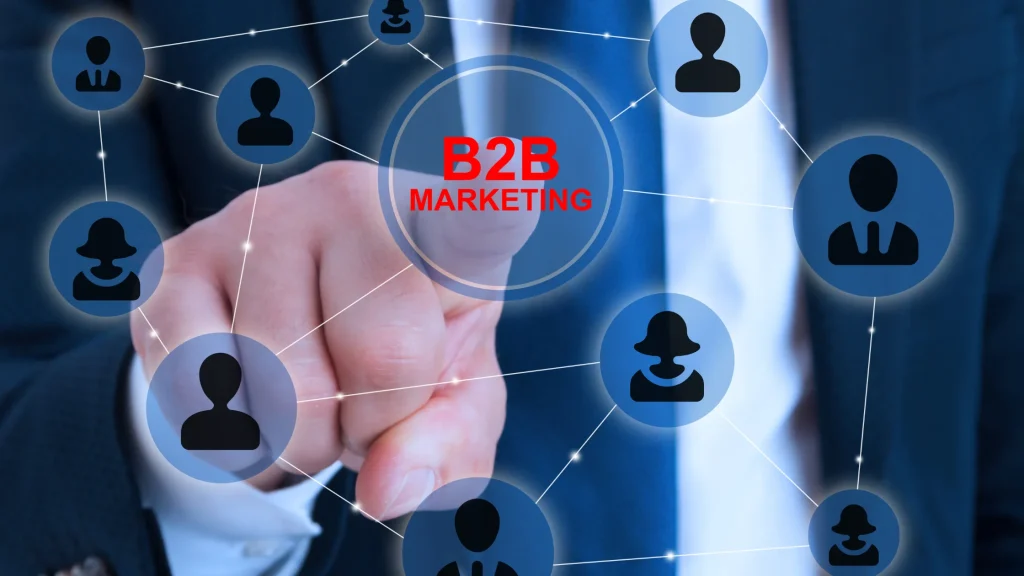In the fast-paced B2B world, digital marketing is key. It helps businesses grow, build relationships, and reach their goals. As more businesses move to the online realm, having an effective B2B digital marketing strategy has become a necessity. The goal of B2B marketing is to build lasting relationships. It aims to influence buying decisions online. This ensures the business is easy to find for its target audience.
B2B marketing focuses on selling products or services between businesses. This is different from B2C marketing, which targets consumers. B2B marketing strategies are quite different from B2C ones. This is because B2B has longer sales cycles and higher transaction values. Also, B2B focuses on building trust with decision-makers in other businesses.
Key Differences Between B2B and B2C Marketing
Understanding the key differences between B2B and B2C marketing is crucial for businesses looking to optimize their strategies. B2C marketing often targets emotions and quick purchases. In contrast, B2B marketing relies on logic, ROI, and building long-term relationships. B2B buyers follow a detailed journey. They research, evaluate, and engage in various touchpoints before deciding.
B2B marketing strategies focus on educating potential customers. They aim to establish the brand’s authority and solve specific business challenges. This is where digital channels like content marketing, email marketing, and social media marketing come into play.
Best B2B Digital Marketing Strategies

To stand out in the business-to-business market, companies need to implement effective and well-planned B2B digital marketing strategies. Here are some of the most successful approaches:
Content Marketing for B2B Companies
Content marketing is one of the best B2B marketing strategies that B2B companies can use to reach their target audience. B2B brands can earn trust by sharing useful content. This content should tackle the audience’s challenges.
By doing this, brands can also become thought leaders in their industry. Creating a B2B content marketing strategy involves producing whitepapers, blogs, case studies, webinars, and other resources that offer solutions.
Leveraging SEO for B2B Digital Marketing
Search Engine Optimization (SEO) is a powerful tool in digital marketing that helps B2B companies rank higher in search results and increase visibility. Optimizing a B2B website for search engines helps businesses attract organic traffic.
This way, they can catch the eye of potential clients. This means using the right keywords for products and services. It also involves optimizing landing pages and making sure the experience is user-friendly.
Email Marketing Campaigns for B2B Leads
Email marketing remains one of the most effective B2B marketing campaigns. By creating personalized emails and automating the process, B2B marketers can nurture leads through the marketing funnel, offering tailored content at each stage of the buying journey. Email marketing helps you stay in touch with prospects and clients. It gives them useful updates and product offers.
Social Media Strategies for B2B Marketing
Social media marketing is not just for B2C marketing. B2B companies can use platforms like LinkedIn, Twitter, and Facebook. These tools help them build brand awareness and connect with decision-makers. Businesses can build their B2B brand by sharing valuable content. They should also engage with followers. This helps create strong relationships with key stakeholders.
Benefits of B2B Digital Marketing

The benefits of B2B digital marketing are immense and play a significant role in driving business success. These include:
Enhanced Reach and Targeting Capabilities
One of the major advantages of digital marketing for B2B businesses is the ability to reach a broader audience with precision. Businesses can use tools like SEO, PPC advertising, and email marketing. These tools help them target their ideal customers. They can focus on factors such as industry, company size, and job title.
Cost-Effectiveness of Digital Marketing for B2B Companies
Compared to traditional marketing methods, digital marketing tends to be more cost-effective. With the ability to measure performance in real-time, businesses can adjust their strategies as needed, ensuring the best results for their B2B marketing efforts.
Building Long-Term Customer Relationships
Through consistent, personalized engagement, B2B digital marketing helps businesses build lasting relationships with clients. Marketing for B2B involves creating value at every stage of the customer journey, from the first touchpoint to post-sale support.
Increased Lead Generation and Conversion Rates
By optimizing their digital marketing efforts, B2B companies can improve their lead generation strategies. Using tools like marketing automation software and account-based marketing, businesses can convert leads into customers more efficiently, resulting in higher conversion rates.
Best Practices in B2B Digital Marketing
To achieve success in B2B marketing, businesses must adhere to proven best practices that improve their chances of success:
Personalizing the B2B Marketing Experience
Personalization is key in today’s digital age. B2B marketers use data to tailor their messages and content, ensuring they resonate with their target audience. By analyzing past behavior and preferences, companies can send the right content at the right time, significantly increasing engagement.
Data-Driven Decision Making in Digital Marketing
B2B marketers use data to make informed decisions about their campaigns. Whether it’s analyzing website analytics, social media insights, or email campaign results, data allows companies to fine-tune their digital marketing strategies, ensuring that they are always improving their marketing activities.
Automating Marketing for Efficiency
Marketing automation is one of the most effective tools for B2B marketers. With the help of marketing automation software, businesses can streamline repetitive tasks like sending emails, nurturing leads, and tracking customer interactions. This results in a more efficient process and a higher return on investment (ROI).
Creating a B2B Marketing Plan

A well-thought-out marketing plan is essential for the success of any B2B company. Here’s how businesses can create an effective plan:
Setting Clear Marketing Goals for B2B Companies
The first step in building a B2B marketing plan is to establish clear, measurable goals. These goals could include increasing website traffic, generating more leads, or improving conversion rates. Having a solid plan ensures that every marketing effort is aligned with the company’s overall objectives.
Identifying Your Target Audience in B2B Marketing
Understanding the B2B buyer and their journey is key to building a successful marketing plan. This involves identifying key decision-makers, understanding their pain points, and crafting strategies that appeal to their needs.
Developing a Compelling Value Proposition
The value proposition is what sets a company apart from its competitors. A strong value proposition outlines the unique benefits of a product or service, helping businesses attract and retain customers in a competitive market.
Also Read: Digital Marketing Agency for Startups: Boost Growth 2025!
Measuring the Success of B2B Digital Marketing Campaigns
Measuring success is essential in any B2B digital marketing strategy. The key to improving marketing efforts is understanding what works and what doesn’t.
Key Performance Indicators (KPIs) for B2B Digital Marketing
Businesses need to define specific KPIs to measure the success of their digital marketing campaigns. Some important KPIs include website traffic, lead conversion rates, social media engagement, and return on investment (ROI).
Analyzing and Interpreting Campaign Results
By regularly reviewing performance metrics, businesses can determine the effectiveness of their B2B marketing channels. This data provides insight into which strategies are driving success and which need to be adjusted.
The Future of B2B Digital Marketing
As digital marketing continues to evolve, businesses in the B2B space must adapt to new trends and tools. The future of B2B marketing is heavily reliant on technology, data, and automation. To stay competitive, businesses must keep up with trends like influencer marketing, video marketing, and AI-driven marketing. Businesses can refine their B2B marketing strategies to reach their target audience. This helps ensure long-term success and growth.
